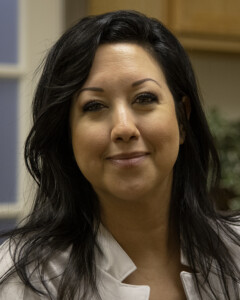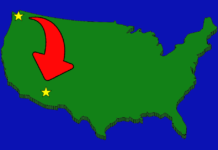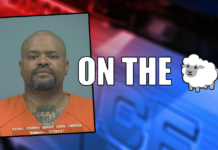
When Maricopa announced its proclamation for National Crime Victims’ Rights Week during an April 18 city council meeting, Jim DeVenezia noted the cultural shift in victims’ rights advocacy.
“The days of ‘suck it up, get over it, it happens to everybody else’ are over. It’s over,” said DeVenezia, a community support specialist for the Maricopa Police Department.
That movement to believe victims, to remove the barriers they face to obtain justice and to amplify their voices are part of the purpose of National Crime Victims’ Rights Week. It has been recognized every April since 1981 by the Department of Justice’s Office for Victims of Crime.
For 2023, the week’s theme emphasized the voices of survivors and creating environments where they can be heard and supported. To recognize that, InMaricopa sat down with two leaders of the local domestic violence awareness community to share their experiences in finding their voice to help others in abusive environments.
‘I am a thriving survivor of abuse’
Tessa Milne is the CEO of Face of a Survivor and spent much of her life surrounded by abuse.
“I grew up with abuse in my household and I ended up in an abusive relationship in my early 20s,” she said. “Unfortunately, my story is not the only one like that out there.”
In Arizona, 42% of women and 33% of men experience some form of intimate partner violence, according to statistics from the National Coalition Against Domestic Violence. More than 1 in 15 children are exposed to this kind of violence and 90% witness abuse.
For Milne, that abuse included enforcing silence, which impacted her emotional state.
“We grew up not using our voice,” she said. “We were told not to talk about the abuse. We don’t talk about it, we don’t air our family’s dirty laundry… I was so hurt all the time, and I tolerated so much.”

After she left an abusive relationship and began group therapy, Milne began the journey of finding her voice.
“One day, I decided that I would look in the mirror every single day and say, ‘I’m a survivor,’” she said. “I did that every single day and then, one day, I decided to say, ‘I’m a survivor because.’”
Adding the word “because” to her daily mantra created a deeper meaning that allowed her to see progress and that she had the ability to heal from her trauma.
“One day, I looked in the mirror and thought, ‘This is what a survivor looks like. I am a face of a survivor.’”
Milne now works to spread awareness about the impacts of domestic violence and bullying through her organization, Face of a Survivor.
“A lot of victims don’t have the resources at their fingertips,” Milne said. “I didn’t have those; I had no idea what was out there when I was a victim… There’s people that want to see you succeed. A lot of victims don’t know that.”
‘You are taught don’t talk, don’t trust’
Tiffany Mensah, founder and executive director of the DOVES Network, also grew up in an abusive household.
“I watched my father abuse my mother,” she said. “My mother fled for safety multiple times until she divorced my dad when I was 17.”
Like Milne, Mensah felt she lacked a voice while growing up and that impression continued even after fleeing the abusive environment.
“You are taught don’t talk, don’t trust, don’t feel,” she said. “I felt lonely and isolated. I felt forgotten, like I wasn’t wanted, and I was just collateral damage (for my mother).”
Seeing herself as “collateral damage” was a result of adults assuming children who are not the primary target of abuse are less affected.
“Everyone was sympathetic to my mother, but they didn’t show that same sympathy or empathy to me, which caused me to act out,” Mensah said. “I remember the different folks we stayed with would tell me, ‘You need to get over it, your mother is going through this and there’s nothing wrong with you.’”
However, statistics prove otherwise. Every 44 minutes, one or more children in Arizona witnesses domestic violence, according to the Maricopa County Attorney’s Office. These children are three times more likely to engage in violent behavior than their peers and are at a higher risk of becoming abusers or victims later in life since they may view domestic violence as normal.
Mensah saw that cycle continue in her relationships as a teenager.
“I was in my first domestic violence relationship as a teen, and I didn’t know abuse could be more than just physical violence,” she said. “I dealt with verbal abuse, manipulation and stalking. I thought all these layers were evidence of love, but I lacked the knowledge to be aware of that.”
Today, Mensah strives to empower and support teens through the DOVES Network, which stands for Daily Overcoming Violence and Embracing Safety.
“I want them to know they’re heard, they’re not forgotten and that healing is possible,” Mensah said. “Being able to create a safe space to lay those seeds of healing work was important.”
Additional resources for people experiencing domestic violence in Maricopa include:
- National Domestic Violence Hotline: 800-799-SAFE (7233)
- Arizona Coalition to End Sexual & Domestic Violence: 602-279-2980
- Hope Women’s Center: 520-568-0532
- Against Abuse, Inc.: 520-836-0858

![Rizz party organizers say city ‘lying’ One of several flyers for a "TikTok rizz party" is taped to a door in the Maricopa Business Center along Honeycutt Road on April 23, 2024. [Monica D. Spencer]](https://www.inmaricopa.com/wp-content/uploads/2024/04/spencer-042324-tiktok-rizz-party-flyer-web-218x150.jpg)



![O’Reilly gears up for second Maricopa location An exterior view of O'Reilly Auto Parts on John Wayne Parkway on May 2, 2024.[Monica D. Spencer]](https://www.inmaricopa.com/wp-content/uploads/2024/05/spencer-050224-oreilly-second-location-web-218x150.jpg)
![Province writer opens the athlete’s mind in new book Tom Schuman, a Province resident, poses with a copy of his new book, "My Wide World of Sports," outside his home on May 2, 2024. [Monica D. Spencer]](https://www.inmaricopa.com/wp-content/uploads/2024/05/spencer-050224-tom-schuman-sports-book-web-01-218x150.jpg)




![Maricopa restaurateur makes Food Network connection [Namkeen Dhaba]](https://www.inmaricopa.com/wp-content/uploads/2024/04/439456716_377105198650519_7536248579664805896_n-218x150.jpg)

![Merging lanes incite more 347 anger A merging lane sign sits on the side of State Route 347 northbound lanes during evening traffic on April 30, 2024. [Monica D. Spencer]](https://www.inmaricopa.com/wp-content/uploads/2024/04/spencer-043024-adot-merging-lanes-347-web-218x150.jpg)
![Rizz party organizers say city ‘lying’ One of several flyers for a "TikTok rizz party" is taped to a door in the Maricopa Business Center along Honeycutt Road on April 23, 2024. [Monica D. Spencer]](https://www.inmaricopa.com/wp-content/uploads/2024/04/spencer-042324-tiktok-rizz-party-flyer-web-100x70.jpg)


